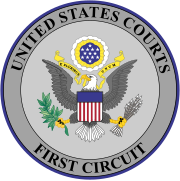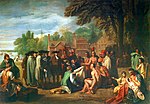|
Mashpee Tribe v. New Seabury Corp.
Mashpee Tribe v. New Seabury Corp., 592 F.2d 575 (1st Cir. 1979), was the first litigation of the Nonintercourse Act to go to a jury.[1] After a 40-day trial, the jury decided that the Mashpee Tribe was not a "tribe" at several of the relevant dates for the litigation, and the United States Court of Appeals for the First Circuit upheld that determination (the panel included two judges from the landmark Joint Tribal Council of the Passamaquoddy Tribe v. Morton (1975) panel). The Mashpee, as a tribe and individually, attempted to re-litigate the issue several times without success.[2] In 2007, the Department of the Interior granted federal recognition to the Mashpee,[3] and the tribe and the town of Mashpee, Massachusetts entered into a settlement agreement.[4] BackgroundThe Mashpee lands were sold in 1834 and 1870 without federal consent.[5] The Mashpee claim implicated 11,000 acres, worth approximately $30,000,000 at the time of trial.[1] The Mashpee's attempts to settle the claim were rebuffed.[1] TrialThe Mashpee filed suit on August 16, 1976 against a defendant class of land owners in the town of Mashpee.[5] The United States District Court for the District of Massachusetts opted to hold separate trials, beginning with the issue of tribal status at the time of the suit and the time of the transactions.[5] The Mashpee attempted to obtain a continuance so that the Department of the Interior could determine their tribal status instead, but the court denied their motion.[5] The trial began on October 17, 1977.[5] After forty days of trial, special interrogatories were submitted to the jury on January 4, 1978.[5] The verdict was returned on January 6, finding that the Mashpee were a tribe on March 3, 1834 (when the District of Mashpee was established) and on March 3, 1843 (when the District of Mashpee was partitioned) but were not a tribe on July 22, 1790 (the day the first Nonintercourse Act was passed), June 22, 1869 (the date on which the state law restraints on alienation were removed by the legislature), May 28, 1870 (the date on which the town of Mashpee was incorporated), or when the suit was filed.[6] The plaintiffs moved for a new trial on the basis that the special verdict was inconsistent. This motion was denied.[7] All-in-all, the defendants paid $350,000 in legal bills.[8] OpinionBefore the First Circuit, the Mashpee argued: (1) that the district court should have granted their motion for a continuance; (2) that the district court erred in instructing the jury on the definition of a "tribe"; (3) that the district court erred in allocating the burden of proof to the Mashpee; (4) that the district court erred in not granting a new trial on the basis of the special verdict; and (5) that the district court erred in its handing of ex parte communication with a juror.[7] The First Circuit rejected all these arguments and affirmed. ContinuanceThe First Circuit rejected the idea that the district court should have waited for an agency determination, holding: "[T]his is not the kind of case in which the Supreme Court has required courts to defer to administrative process."[7] Much of the holding focuses on the historical inaction of the Department in developing a procedure for contested determinations:'
To that end, the court added the qualification that "once the Department has finally approved its regulations and developed special expertise through applying them, we might arrive at a different answer."[9] Additionally, the First Circuit found that the issues were suitable for in-court determination:
Definition of "tribe"The First Circuit noted that tribal status often goes unlitigated because federally recognized tribes are presumed to be tribes in the legal sense.[10] Instead, the district court had relied upon the definition from Montoya v. United States (1901): "By a ‘tribe’ we understand a body of Indians of the same or similar race, united in a community under one leadership or government, and inhabiting a particular though sometimes ill-defined territory . . . ."[10] The court reviewed at length the supplemental instructions the trial court had given to clarify that definition.[11] The First Circuit approved those instructions, with a rather substantial caveat:
Judge Bownes, concurring, would have held the instruction correct as a matter of law, rather than merely consistent enough with the objecting party's view of the law.[13] Burden of proofThe district court had allocated the burden of proof to the plaintiff on all issues.[14] The plaintiff's argued first that the district court should have at least shifted the burden to the defendants to prove that they had ceased to be a tribe for the periods after which the jury determined the tribe had carried its burden.[14] Second, the Mashpee argued that 25 U.S.C. § 194 shifted the burden.[14] That section provides: "In all trials about the right of property in which an Indian may be a party on one side, and a white person on the other, the burden of proof shall rest upon the white person, whenever the Indian shall make out a presumption of title in himself from the fact of previous possession or ownership."[15] The First Circuit held the statute had no application to the initial question of whether the plaintiff was a tribe.[16] Special verdict consistencyThe Mashpee argued that the verdict was inconsistent because there was no way a tribe in existence in 1842 could have voluntarily ceased being a tribe by 1869.[17] The First Circuit agreed that it was unlikely, but, drawing all inferences in favor of the verdict, not impossible.[18] Juror communicationAfter the trial, a bus commuter notified the court that one juror had talked about his involvement in the case on the bus and mentioned a threatening phone call he had received. The district court, with counsel for both sides present, questioned the former jury about the incident and concluded that it had not affected the verdict enough to merit a new trial. The First Circuit held that the trial judge did not abuse his discretion by doing so.[19] Notes
References
Further reading
Information related to Mashpee Tribe v. New Seabury Corp. |
||||||||||||||||||||||||

